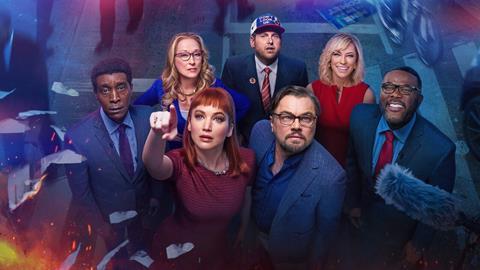The Netflix hit is a biting satire about climate change and the end of the world. But for Christians, there's even more to the story, says our reviewer

Back in the day it was popular to lampoon the solitary figure walking through the city wearing a sandwich board proclaiming “The End of the World is Nigh”. Today’s sandwich board is worn by an all-star cast headed by Leonardo DiCaprio, Jennifer Lawrence, Mark Rylance, Cate Blanchett, Meryl Streep and more, in writer and director Andy McKay’s Don’t Look Up, but the same message endures.
An unknown astronomer, Kate Dibiasky (Jennifer Lawrence), doing doctoral research, and her supervisor, Dr Randall Mindy (Leonardo DiCaprio), return from a field trip having accidentally discovered a large comet headed directly for earth. What is not at issue is the seriousness of the impending crisis. Impact will come in a mere six months. Getting that message across is of utmost urgency both to those who can do something about it, and to everyone else, to prepare for an upheaval. How they (or we) respond to a far-away crisis is the real subject matter and the film is widely being reviewed as a parable of the world’s response to climate change.
Satire is serious stuff – a blend of jokes and jibes at our expense. To be clear, despite the humour (and it is absurdly funny regardless of the lack of one-liner belly-laughs) this disaster spoof is not intended as a joke. It’s far too biting for that. The characters are only slightly larger-than-life exaggerations of all-too familiar roles. Scientists suddenly becoming media figures; entrepreneur billionaires knowing how to turn any crisis into an instant cash-cow; television anchors being more devoted to the breakfast show’s brand than disseminating truth – such themes may reinforce many of our own prejudices. But beware. We are all in the firing line here. Would we succumb to short-term pleasure sacrificing marriage, family life and long-term relationships when faced with temptation and the end of the world? How secure is our own moral foundation?
President Orlean (Meryl Streep), the cynical politician facing re-election, articulates in her own context what anyone could be thinking, “Let’s bottom-line this: What’s this gonna cost me? What’s the ask here?” Her team instantly know how to dial down bad news. We might snort at such shallow political short-termism when, in this chronicle, we are all potentially as doomed as everyone else, but this is also the real world our politicians operate in as they balance polls, taxes and votes. Fantasy and reality collide in parody. Or do they overlap?
It's a parable of how most people treat the gospel
After a lifetime of ministry and church leadership I confess to being intrigued by this film’s social commentary. Treating the reactions of all the different people and groups to the disastrous news of impending destruction as a parable of how most people treat the gospel most of the time revealed a rather good fit. From about 15 minutes in I found I was watching this movie, not only as a cultural send-up in its own terms, enjoying the humour and the caricature characters, but also from this ‘social comment and the gospel’ perspective.
All the methods I have encountered to negotiate a way through life without facing inevitable death and even a serious possibility of meeting God one day were are on display in this disaster movie. Flat out denials of the evidence. Busyness (and the suggestion there are more important things to be worrying about than the end of your life). Short-term pleasures overriding longer-term interests. Even the sin of cheating on loved ones was evident in the film, proving that living for self can itself be a distraction from what really matters.
Don’t Look Up and see an approaching apocalyptic appointment with destiny for yourself – you might have to plan ahead!
Don't Look Up (15) is available on Netflix now


































